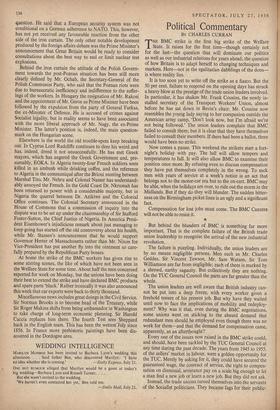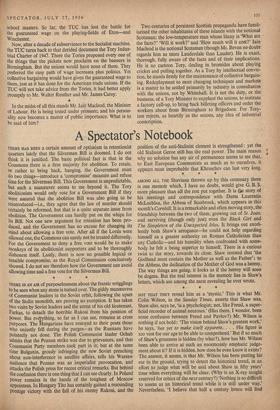Political Commentary
BY CHARLES CURRAN THE BMC strike is the first big strike of the Welfare State. It raises for the first time—though certainly not for the last—the question that will dominate our politics as well as our industrial relations for years ahead; the question of how Britain is to adapt herself to changing techniques and markets. Here—not in the egalitarian dabblings of the dons— is where reality lies.
It is too soon yet to write off the strike as a fiasco. But the 50 per cent. failure to respond on the opening days has struck a heavy blow at the prestige of the trade union leaders involved. In particular, it has shaken Mr. Frank Cousins, the newly in- stalled secretary of the Transport Workers' Union, almost before he has sat down in Bevin's chair. Mr. Cousins now resembles the young lady saying to her companion outside the American army camp, 'Don't look now, but I'm afraid we're not being followed.' The union leaders complain that BMC failed to consult them; but it is clear that they have themselves failed to consult their members. If there had been a ballot, there would have been no strike.
Now comes a pause. This weekend the strikers start a fort- night's holiday with pay. The lull will allow tempers and temperatures to fall. It will also allow BMC to examine their position once more. By refusing even to discuss compensation they have put themselves completely in the wrong. To sack men with years of service at a week's notice is an act that belongs not to the motor-car era but to the ox-cart. BMC may be able, when the holidays are over, to ride out the storm in the Midlands. But if they do they will blunder. The sudden bitter- ness on the Birmingham picket lines is an ugly and a significant fact.
Compensation for lost jobs must come. The BMC Canutes will not be able to resist it.
But behind the blunders of BMC is something far more important. That is the complete failure of the British trade union leadership to recognise the arrival of the new industrial revolution.
The failure is puzzling. Individually, the union leaders are by no means negligible persons. Men such as Mr. Charles Geddes, Sir Vincent Tewson, Mr. Sam Watson, Sir Tom Williamson are far from negligible; each of them is marked by a shrewd, earthy sagacity. But collectively they are nothing. On the TUC General Council the parts are far greater than the whole.
The union leaders are well aware that British industry can- not be put into a deep freeze, with every worker given a freehold tenure of his present job. But why have they waited until now to face the implications of mobility and redeploy- ment? Why was it that, even during the BMC negotiations, some unions went on sticking to the absurd demand that redundant men should be employed even though there was no work for them—and that the demand for compensation came, apparently, as an afterthought?
Every one of the issues now raised in the BMC strike could, and should, have been tackled by the TUC General Council at any time during the past decade. The years from 1945 to 1955, of the sellers' market in labour, were a golden opportunity for the TUC. Merely by asking for it, they could have secured' the guaranteed wage, the contract of service, the right to compen- sation on dismissal, severance pay on a scale big enough to let a man find a new job or learn a new job. But they did not ask.
Instead, the trade unions turned themselves into the servants of the Socialist politicians. They became fags for their public- school masters. So far. the TUC has lost the battle for the guaranteed wage on the playing-fields of Eton—and Winchester.
Now, after a decade of subservience to the Socialist machine, the TUC turns back to that derided document the Tory Indus- trial Charter of 1947. There the Tories proposed every one of the things that the pickets now proclaim on the banners in Birmingham. But the unions would have none of them. They preferred the easy path of wage increases plus politics. Yet collective bargaining would have given the guaranteed wage to them, just as it has done for the American trade unions. If the TUC will not take advice from the Tories, it had better apply promptly to Mr. Walter Reuther and Mr. James Carey.
In the midst of all this stands Mr. lain Macleod, the Minister of Labour. He is being tested under pressure; and his person- ality now becomes a matter of public importance. What is to be said of him? Two centuries of persistent Scottish propaganda have famil- iarised the other inhabitants of these islands with the notional Scotsman; the low-temperature man whose litany is 'What are the facts?' Will it work?' and 'How much will it cost?' lain Macleod is the notional Scotsman (though Mr. Bevan no doubt regards him as more Lauderdale than Lauder). He is exact. thorough, fully aware of the facts and of their implications. He is no cartoon Tory, dealing in bromides about playing cricket and pulling together. As a Tory by intellectual convic- tion, he stands firmly for the maintenance of collective bargain- ing. Redeployment to meet changing techniques and markets is a matter to be settled primarily by industry in consultation with the unions, not by Whitehall. It is not the duty, or the business, of a Tory Minister to supplant the unions, to institute a factory call-up, to bring back billeting officers and order the workers about from Birmingham to Brigadoon. For Tory- ism rejects, as heartily as the unions, any idea of industrial conscription.



































 Previous page
Previous page